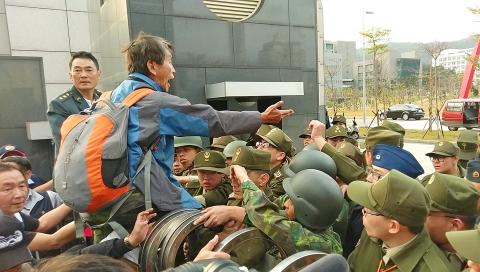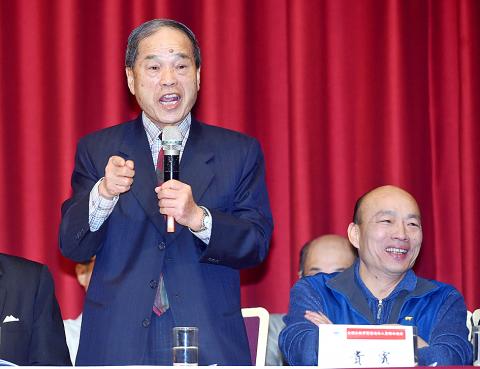Chinese Nationalist Party (KMT) politicians yesterday played down comments by KMT official Chen Keng-chin (陳庚金), who called on public servants to “goof around as much as possible and milk their jobs for all they are worth” to “drag down the government.”
Chen, who heads the party’s Evaluation and Discipline Committee, on Wednesday told the general assembly of the Association of Retired Public Servants, Teachers, Military and Police of the Republic of China that “public officials, farmers, artisans and merchants” are essentially different and there is no possibility of “absolute equality” among them.
He compared the government’s pension reform to China under Mao Zedong (毛澤東) and called on the audience to “overthrow” a government that would “manufacture that kind of class struggle.”

Photo: Fang Pin-chao, Taipei Times
Chen said that as “actions speak louder than words, we should tell military personnel, public servants and teachers to stand with us and goof around as much as possible and milk their jobs for all they are worth.”
“Let’s drag down this government,” said Chen, a former presidential adviser and former head of the Personnel Administration Bureau.
KMT Vice Chairman and association chairman Jason Hu (胡志強) spoke after Chen, saying: “Our [former] presidential adviser’s words are impassioned and meaningful.”

Photo: Liao Chen-huei, Taipei Times
KMT Vice Chairman Hau Lung-bin (郝龍斌), who is vying for the chairperson position, told the convention that if elected, he would follow the association’s lead to fight Democratic Progressive Party (DPP) pension reforms.
Hau said yesterday that he did not hear Chen’s speech.
However, he said that the DPP administration’s policies — not just pension reform, but others such as labor reform and a proposal to lift restrictions on Japanese prefectures hit with a ban on importing foodstuffs after the meltdown at the Fukushima Dai-ichi nuclear plant — have stirred public discontent.
Hu wrote on Facebook that he “certainly does not support the idea of public servants goofing around,” and said that Chen was “joking.”
KMT caucus secretary-general Lin Wei-chou (林為洲) said he suspects that Chen’s remarks were “emotional words uttered off the top of his head.”
It was out of bitterness sparked by the government’s change of mind over paying pensions to retired officials as promised, Lin said.
However, public officials are bound by laws and would be fired if they “goof around” too much, Lin said, calling for rational discussion.
Chen and Hu are beneficiaries of the current pension system after their years of service with the KMT and as public officials, DPP Legislator Lee Chun-yi (李俊俋) said, adding that they will therefore be affected by pension reform.
Lee called on the KMT to propose its own pension reform plan before the legislature starts reviewing the government’s proposals.
The KMT could propose to keep pensions for retirees and cut benefits for public servants in the workforce today, or it could propose safeguarding the practice of combining service years at the KMT and government agencies and see if the people accept that, Lee said with apparent sarcasm.
Presidential Office spokesperson Alex Huang (黃重諺) said that the goal of pension reform is to guarantee that every Taiwanese can retire with financial security, while allowing the state’s limited resources to be fairly and sustainably distributed.
“I think [Chen’s] remarks are not worth commenting on,” Huang said.
“We are surprised that this kind of statement came from a senior former official who once headed the Department of Personnel Administration,” he said.
“No one would believe that Chen’s words represent military personnel, public servants and teachers who are diligently serving the country,” Huang said.
Additional reporting by Wang Jie, Tseng Wei-chen and CNA

AGING: As of last month, people aged 65 or older accounted for 20.06 percent of the total population and the number of couples who got married fell by 18,685 from 2024 Taiwan has surpassed South Korea as the country least willing to have children, with an annual crude birthrate of 4.62 per 1,000 people, Ministry of the Interior data showed yesterday. The nation was previously ranked the second-lowest country in terms of total fertility rate, or the average number of children a woman has in her lifetime. However, South Korea’s fertility rate began to recover from 2023, with total fertility rate rising from 0.72 and estimated to reach 0.82 to 0.85 by last year, and the crude birthrate projected at 6.7 per 1,000 people. Japan’s crude birthrate was projected to fall below six,

US President Donald Trump in an interview with the New York Times published on Thursday said that “it’s up to” Chinese President Xi Jinping (習近平) what China does on Taiwan, but that he would be “very unhappy” with a change in the “status quo.” “He [Xi] considers it to be a part of China, and that’s up to him what he’s going to be doing, but I’ve expressed to him that I would be very unhappy if he did that, and I don’t think he’ll do that. I hope he doesn’t do that,” Trump said. Trump made the comments in the context

SELF-DEFENSE: Tokyo has accelerated its spending goal and its defense minister said the nation needs to discuss whether it should develop nuclear-powered submarines China is ramping up objections to what it sees as Japan’s desire to acquire nuclear weapons, despite Tokyo’s longstanding renunciation of such arms, deepening another fissure in the two neighbors’ increasingly tense ties. In what appears to be a concerted effort, China’s foreign and defense ministries issued statements on Thursday condemning alleged remilitarism efforts by Tokyo. The remarks came as two of the country’s top think tanks jointly issued a 29-page report framing actions by “right-wing forces” in Japan as posing a “serious threat” to world peace. While that report did not define “right-wing forces,” the Chinese Ministry of Foreign Affairs was

PREPAREDNESS: Given the difficulty of importing ammunition during wartime, the Ministry of National Defense said it would prioritize ‘coproduction’ partnerships A newly formed unit of the Marine Corps tasked with land-based security operations has recently replaced its aging, domestically produced rifles with more advanced, US-made M4A1 rifles, a source said yesterday. The unnamed source familiar with the matter said the First Security Battalion of the Marine Corps’ Air Defense and Base Guard Group has replaced its older T65K2 rifles, which have been in service since the late 1980s, with the newly received M4A1s. The source did not say exactly when the upgrade took place or how many M4A1s were issued to the battalion. The confirmation came after Chinese-language media reported